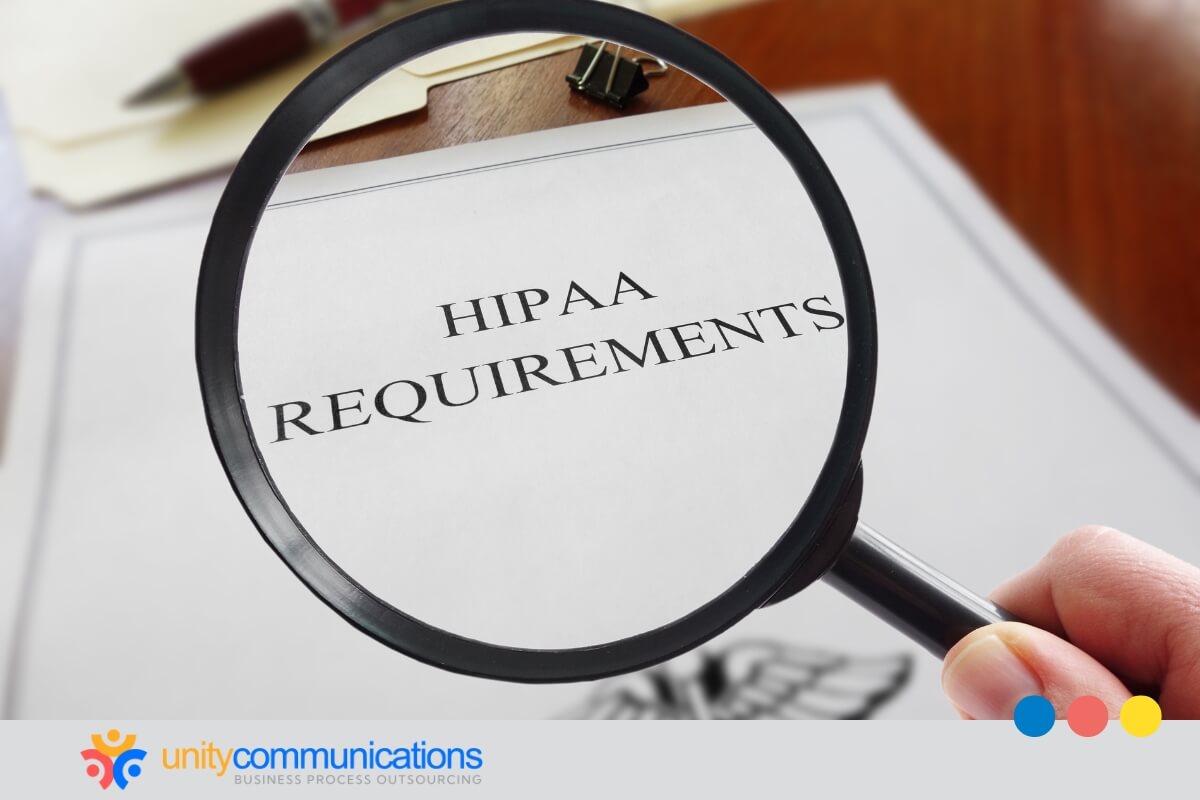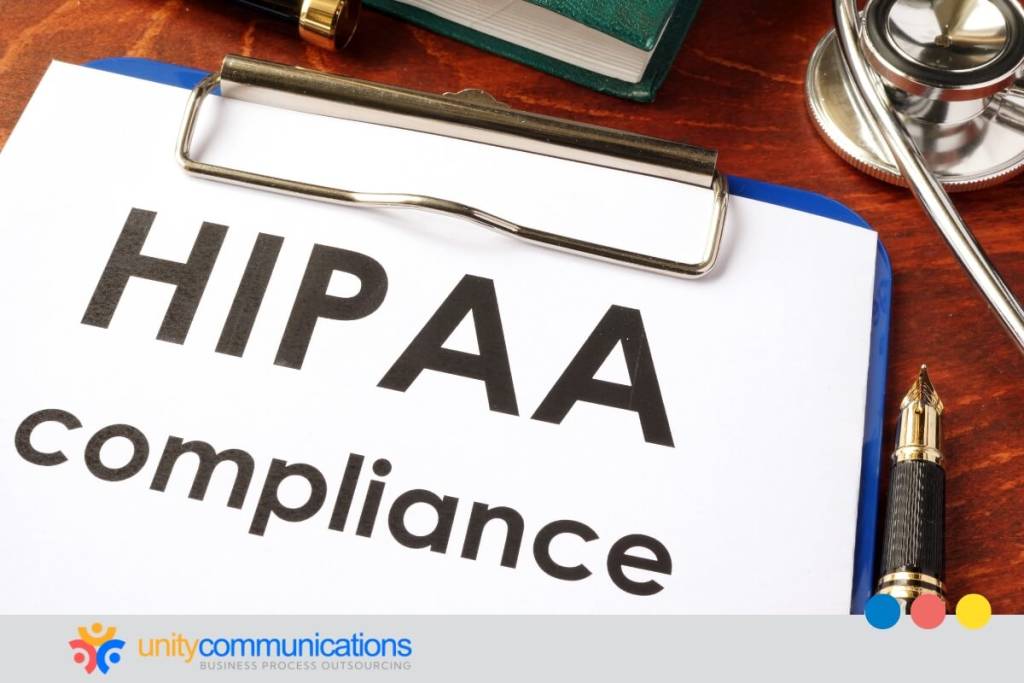IN THIS ARTICLE
Table of Contents
Many healthcare organizations rely on business process outsourcing (BPO) to boost their non-core functions. Assigning massive paperwork and repetitive tasks to a third party helps streamline operations. However, the remote nature of this practice makes sensitive information more susceptible to cyber threats.
Luckily, these third-party providers adhere to the critical requirements of the Health Insurance Portability and Accountability Act of 1996 (HIPAA). The law safeguards confidential medical records against improper disclosure.
Read this page to learn why and how BPO companies ensure HIPAA compliance.
Why Is HIPAA Compliance Crucial to Healthcare Outsourcing?

HIPAA mandates the strict defense of protected health information (PHI). BPO companies keep such data confidential and secure to comply with this rule. Doing so helps them obtain the trust of healthcare clients, patients, and other stakeholders.
Meeting HIPAA requirements also strengthens the credibility and competitive edge of BPO organizations. Their capability to exercise stringent data security standards makes them stand out when vying for healthcare clients. This is especially important for third-party call centers that offer telehealth and help desk services.
Adhering to HIPAA regulations also enhances the overall efficiency of both parties. BPO firms investing in automated security systems, data encryption measures, and remote access controls avoid downtime due to cyberattacks. In turn, they can focus on streamlining your front- and back-office operations, such as customer service, data entry, and infrastructure monitoring.
BPO companies that maintain HIPAA compliance prevent costly fines and lawsuits. The Department of Health and Human Services (HHS) recently adjusted the civil money penalties for HIPAA violations. The potential maximum for “unknowing” and “reasonable-but-not-willful neglect” violations has reached $68,928. The fine also has an annual cap of nearly $2.1 million.
BPO and the HIPAA Compliance Checklist

The healthcare industry is among the sectors hardest hit by data breaches, with 87 million patients recorded as victims of this cybercrime in 2023. The number more than doubled compared to the 37 million individuals affected in the prior year.
Aside from legal penalties, BPO providers pay a high price when dealing with data breaches. Recent statistics show the average cost of a medical information breach was the highest among all sectors at $10.93 million, marking a 53.3% increase from 2021 to 2023.
Thus, service vendors implement comprehensive policies and technical measures to safeguard PHI. They help improve patient care by accomplishing this checklist of HIPAA compliance efforts:
- Understand HIPAA requirements. BPO firms ensure their personnel are well-versed in HIPAA rules, regulations, and prerequisites. They familiarize their core team with data privacy, security, and breach notification procedures through training and awareness programs.
- Assign a HIPAA compliance officer. This official oversees and manages all aspects of HIPAA compliance for third-party and client team members. Their work includes policy development, training, and incident response.
- Carry out a comprehensive risk assessment. This action identifies and addresses potential vulnerabilities to PHI’s confidentiality, integrity, and accessibility. The evaluation informs efforts to develop risk mitigation strategies.
- Draft and implement policies and procedures for HIPAA compliance. This framework includes guidelines for patient data access, management, and security.
- Execute physical and technical safeguards. Deploying access controls for restricted areas helps prevent unauthorized physical usage of PHI. On the technical side, firewalls, multifactor authentication strategies, and secure transmission protocols protect electronic PHI.
- Establish and sign business associate agreements (BAAs). Providers enter into BAAs with clients to formalize HIPAA-covered collaboration. This contract outlines the terms and conditions for handling PHI in compliance with the law.
- Review and update BPO HIPAA compliance measures regularly. This step ensures the team adheres to the latest HIPAA requirements and industry-specific best practices in the long term.
- Develop and maintain an incident response plan. This strategy outlines the steps to take during unexpected security incidents or data breaches. It details procedures for investigating such cases, notifying the affected parties, and mitigating the impact.
- Deploy audit controls to monitor and record ePHI-related system activities. Audit logs help detect and respond to suspicious acts that may indicate a data security incident.
- Encrypt ePHI both in transit and at rest. This security measure ensures that data remains unreadable even if unauthorized parties access it. The strategy requires the appropriate decryption keys before anyone can use the information, providing additional protection.
- Exercise practical ways to dispose of sensitive medical records securely. These practices include shredding physical documents containing PHI and wiping electronic devices. They prevent the unintentional disclosure of confidential health data.
- Conduct regular security assessments and penetration testing. These efforts help BPO companies identify vulnerabilities in electronic health record (EHR) systems and processes. The actionable insights guide them in addressing identified weaknesses promptly, enhancing the overall security posture.
- Maintain comprehensive documentation of HIPAA compliance efforts. If you are wondering what BPO’s most crucial role in the healthcare sector is, it’s documentation. Providers keep records of data usage activities, risk assessments, policies, and incident response efforts. These files are essential for future reference in cases of lawsuits.
- Stay informed about updates and changes to HIPAA regulations. Third-party vendors regularly check for recommendations from HHS to ensure ongoing compliance with the law’s latest requirements.
- Engage in regular in-house audits and self-assessments. BPO companies perform these initiatives to evaluate the effectiveness of their HIPAA compliance measures. This proactive approach helps them identify areas to improve adherence to regulatory requirements.
- Limit access to patient data. Service providers execute measures to restrict who can retrieve and use PHI based on job roles and responsibilities. They ensure their employees handle the minimum amount of information required to perform tasks.
- Consult with legal and compliance experts. Support vendors employ healthcare legal and compliance professionals for HIPAA compliance guidance. These specialists provide valuable insights to ensure compliance with HIPAA and other relevant laws.
The Bottom Line

BPO and HIPAA compliance go together when entrusting non-core healthcare functions to a third-party company. Service providers implement best practices to streamline your operations while maintaining their competitive edge.
The checklist of activities above also helps service providers avoid costly litigation and breach mitigation measures. They use these initiatives to strengthen the security of sensitive medical data, fostering trust among patients and stakeholders.
Let’s connect if you seek a BPO partner capable of handling your healthcare data without worrying about potential threats. Unity Communications has dedicated experts and cutting-edge solutions to streamline your tasks while ensuring robust health information security.





